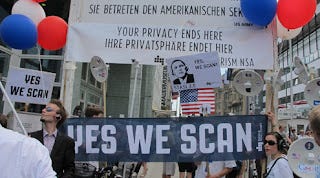Germany's warning to America: "You are entering the American sector. Your privacy ends here."

Berlin - East Germany’s Stasi has long been considered the standard of police state surveillance during the Cold War years, a monitoring regime so vile and so intrusive that agents even noted when their subjects were overheard engaging in sexual intercourse.
Against that backdrop, Germans have greeted with disappointment, verging on anger, the news that somewhere in a U.S. government databank are the records of where millions of people were when they made phone calls or what video content they streamed on their computers in the privacy of their homes.
Even Schmidt, 73, who headed one of the more infamous departments in the infamous Stasi, called himself appalled. The dark side to gathering such a broad, seemingly untargeted, amount of information is obvious, he said.
“It is the height of naivete to think that once collected this information won’t be used,” he said. “This is the nature of secret government organizations. The only way to protect the people’s privacy is not to allow the government to collect their information in the first place.”
Read more here: http://www.mcclatchydc.com/2013/06/26/195045/memories-of-stasi-color-germans.html#storylink=cpy
German Chancellor Angela Merkel, who grew up in East Germany, tried to provide an out for President Barack Obama, offering as a possible explanation for the sweeping nature of the U.S. collection efforts that “the Internet is new to all of us.” She was roundly mocked for that statement, and her administration appeared far less forgiving more recently, when similar spying charges were leveled against the British government.
Germans are dismayed at Obama’s role in allowing the collection of so much information. Before his presidency, hundreds of thousands of Germans turned out to hear him speak in Berlin. During a visit last week, the setup was engineered to avoid criticism: Obama spoke to a small, handpicked audience, many from the German-American school. Access to the Brandenburg Gate, the backdrop for his speech, was severely limited, as was access to Berlin’s entire downtown.
As many Germans as heard Obama speak turned out at quickly arranged protests, including one by self-proclaimed tech nerds near the historic Checkpoint Charlie, where U.S. soldiers welcomed visitors from the communist sector of Berlin for four decades with a sign, “You are entering the American sector.” One demonstrator added this coda: “Your privacy ends here.”
“Everyone knows that gathering so much information is bullshit,” said Reinhard Weisshuhn, a political activist and foreign policy adviser. “It’s a total breach of trust by the government. This is how a society destroys itself.”
Germans, especially those raised in the east, are unconvinced by arguments that the sweeping collection of information is used only to track terrorists. The assertions by U.S. officials that unspecified attacks have been thwarted don’t persuade them, either. They haven’t forgotten the fear of living under a government that used vague threats to justify blanket spying. In East Germany, the threats came under the banner of disloyalty to socialist ideals. In the United States, the monitoring programs come under the banner of anti-terrorism.
Dagmar Hovestaedt is the spokeswoman for the German Stasi Records Agency, which showed 88,000 people last year what the Stasi had gathered on them. She said the U.S. should consider doing the same.
“This is a study on how to deal with the information the NSA is now gathering,” she said of her archive. “To say that the NSA is the equivalent of the Stasi is too simplistic, but the people who are spied on do have a right to know what was learned about their lives, what they had hoped to keep private that was not. Transparency is essential.”
http://www.mcclatchydc.com/2013/06/26/195045/memories-of-stasi-color-germans.html#.UcxAgt7D-Uk



